Individual Learning and Development Plan: CPD1102 Assignment
VerifiedAdded on 2022/10/12
|17
|3556
|276
Report
AI Summary
This report details an individual learning and development plan created by a student pursuing a postgraduate Project Management course at Asia Pacific International College. The plan begins with a self-introduction, outlining the student's background and qualifications. It then explores megatrends and challenges within the project management field, including adapting to change, fulfilling organizational goals, and managing risks. The report outlines the student's professional goals, which include setting specific project goals, effective time management, and good communication. Ethical and professional values such as credibility, integrity, and objectivity are also discussed, emphasizing their importance in project management. The plan includes a competency assessment, evaluating the student's skills in areas like visioning, team management, and risk management, and identifies areas for improvement. Finally, the report examines the stages of competency development, providing a comprehensive overview of the student's learning and development journey within the project management profession.
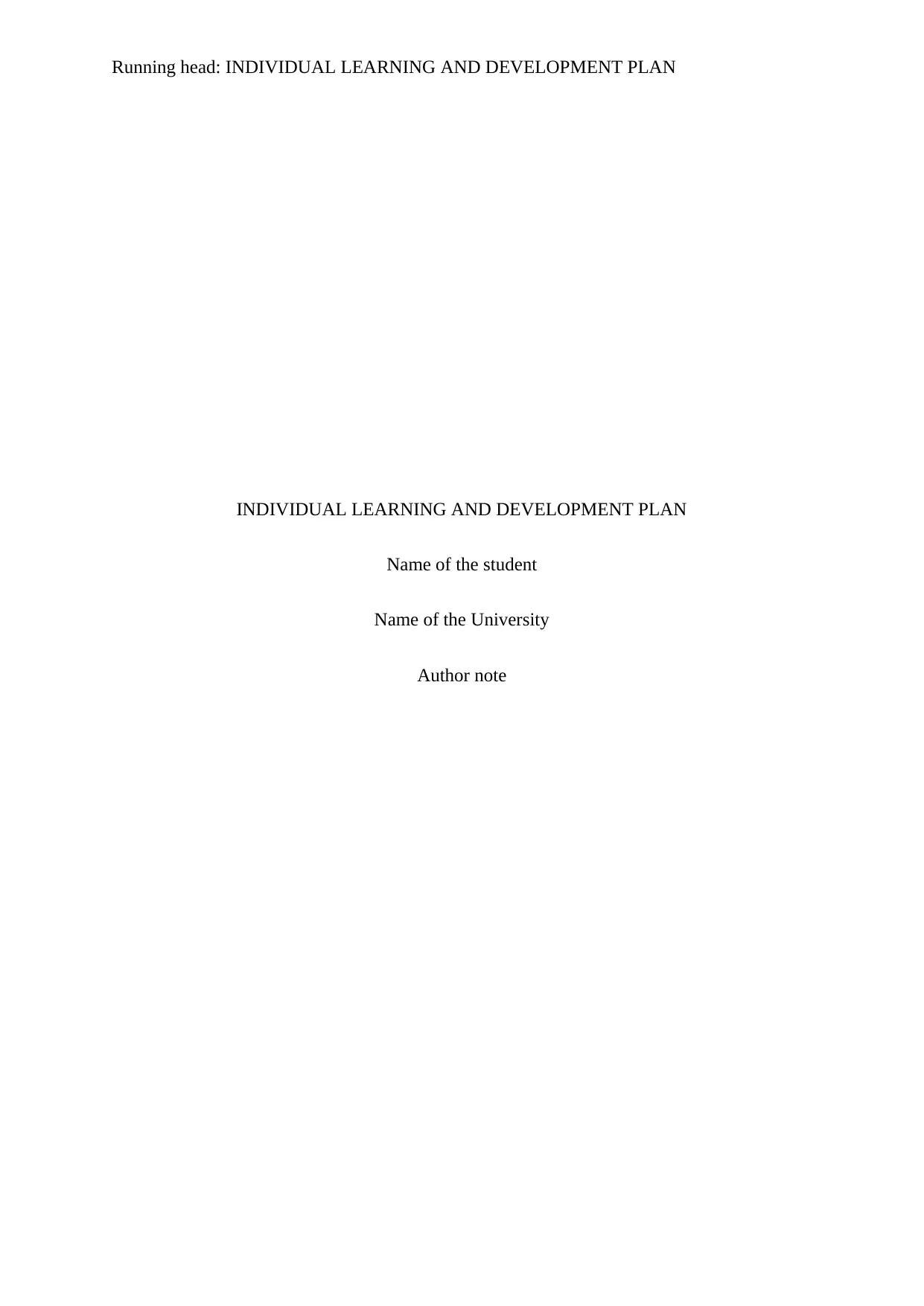
Running head: INDIVIDUAL LEARNING AND DEVELOPMENT PLAN
INDIVIDUAL LEARNING AND DEVELOPMENT PLAN
Name of the student
Name of the University
Author note
INDIVIDUAL LEARNING AND DEVELOPMENT PLAN
Name of the student
Name of the University
Author note
Paraphrase This Document
Need a fresh take? Get an instant paraphrase of this document with our AI Paraphraser
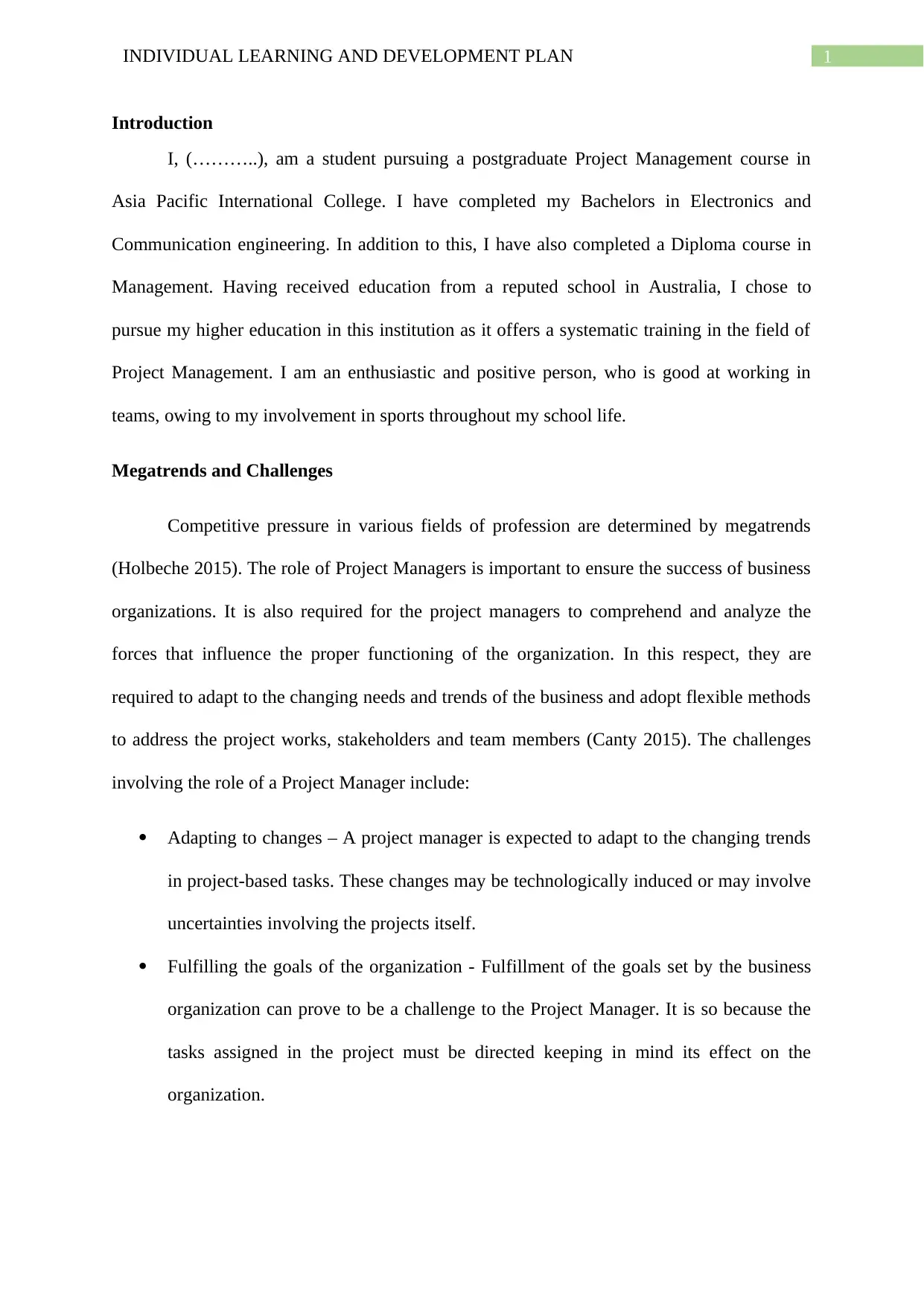
1INDIVIDUAL LEARNING AND DEVELOPMENT PLAN
Introduction
I, (………..), am a student pursuing a postgraduate Project Management course in
Asia Pacific International College. I have completed my Bachelors in Electronics and
Communication engineering. In addition to this, I have also completed a Diploma course in
Management. Having received education from a reputed school in Australia, I chose to
pursue my higher education in this institution as it offers a systematic training in the field of
Project Management. I am an enthusiastic and positive person, who is good at working in
teams, owing to my involvement in sports throughout my school life.
Megatrends and Challenges
Competitive pressure in various fields of profession are determined by megatrends
(Holbeche 2015). The role of Project Managers is important to ensure the success of business
organizations. It is also required for the project managers to comprehend and analyze the
forces that influence the proper functioning of the organization. In this respect, they are
required to adapt to the changing needs and trends of the business and adopt flexible methods
to address the project works, stakeholders and team members (Canty 2015). The challenges
involving the role of a Project Manager include:
Adapting to changes – A project manager is expected to adapt to the changing trends
in project-based tasks. These changes may be technologically induced or may involve
uncertainties involving the projects itself.
Fulfilling the goals of the organization - Fulfillment of the goals set by the business
organization can prove to be a challenge to the Project Manager. It is so because the
tasks assigned in the project must be directed keeping in mind its effect on the
organization.
Introduction
I, (………..), am a student pursuing a postgraduate Project Management course in
Asia Pacific International College. I have completed my Bachelors in Electronics and
Communication engineering. In addition to this, I have also completed a Diploma course in
Management. Having received education from a reputed school in Australia, I chose to
pursue my higher education in this institution as it offers a systematic training in the field of
Project Management. I am an enthusiastic and positive person, who is good at working in
teams, owing to my involvement in sports throughout my school life.
Megatrends and Challenges
Competitive pressure in various fields of profession are determined by megatrends
(Holbeche 2015). The role of Project Managers is important to ensure the success of business
organizations. It is also required for the project managers to comprehend and analyze the
forces that influence the proper functioning of the organization. In this respect, they are
required to adapt to the changing needs and trends of the business and adopt flexible methods
to address the project works, stakeholders and team members (Canty 2015). The challenges
involving the role of a Project Manager include:
Adapting to changes – A project manager is expected to adapt to the changing trends
in project-based tasks. These changes may be technologically induced or may involve
uncertainties involving the projects itself.
Fulfilling the goals of the organization - Fulfillment of the goals set by the business
organization can prove to be a challenge to the Project Manager. It is so because the
tasks assigned in the project must be directed keeping in mind its effect on the
organization.
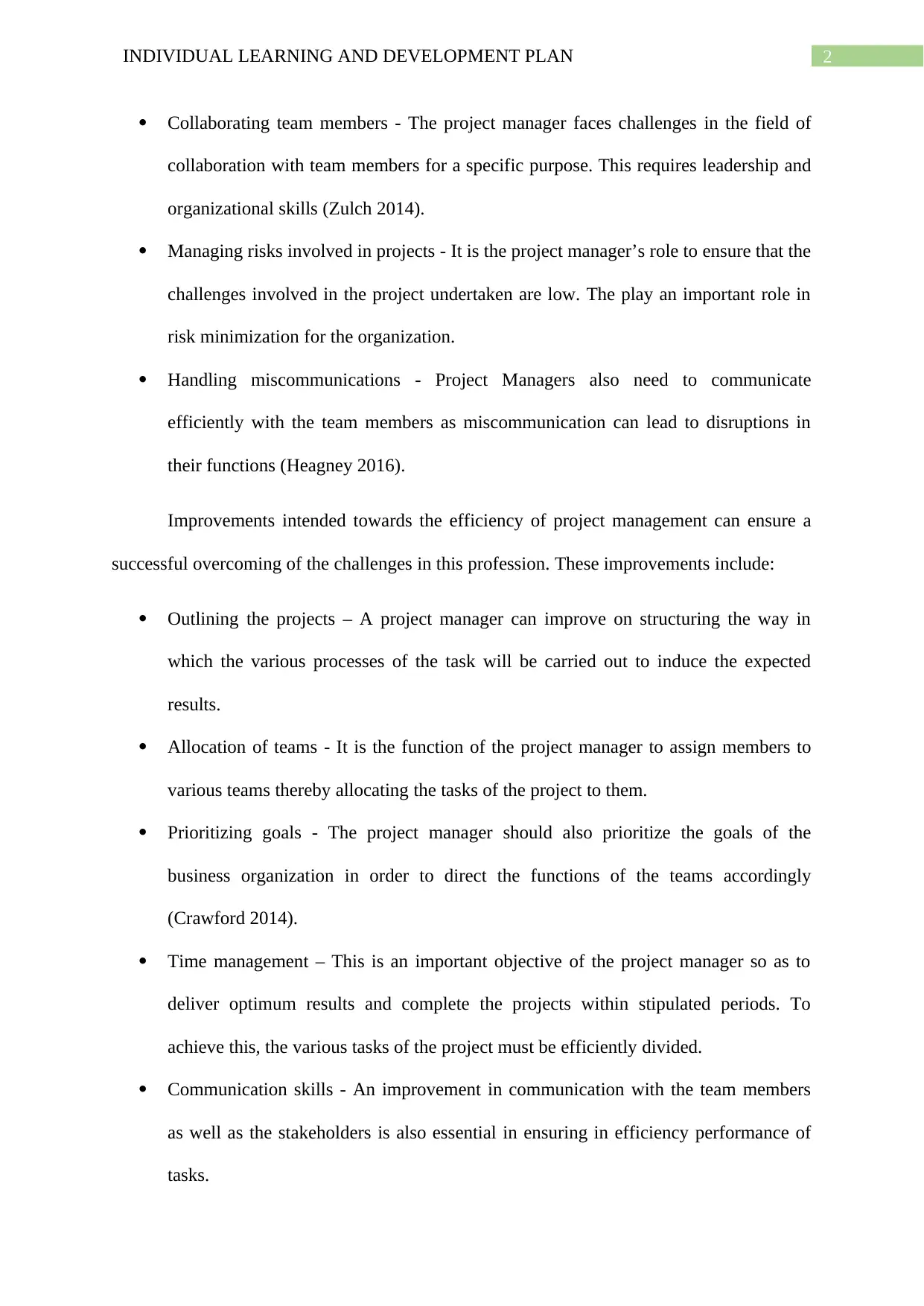
2INDIVIDUAL LEARNING AND DEVELOPMENT PLAN
Collaborating team members - The project manager faces challenges in the field of
collaboration with team members for a specific purpose. This requires leadership and
organizational skills (Zulch 2014).
Managing risks involved in projects - It is the project manager’s role to ensure that the
challenges involved in the project undertaken are low. The play an important role in
risk minimization for the organization.
Handling miscommunications - Project Managers also need to communicate
efficiently with the team members as miscommunication can lead to disruptions in
their functions (Heagney 2016).
Improvements intended towards the efficiency of project management can ensure a
successful overcoming of the challenges in this profession. These improvements include:
Outlining the projects – A project manager can improve on structuring the way in
which the various processes of the task will be carried out to induce the expected
results.
Allocation of teams - It is the function of the project manager to assign members to
various teams thereby allocating the tasks of the project to them.
Prioritizing goals - The project manager should also prioritize the goals of the
business organization in order to direct the functions of the teams accordingly
(Crawford 2014).
Time management – This is an important objective of the project manager so as to
deliver optimum results and complete the projects within stipulated periods. To
achieve this, the various tasks of the project must be efficiently divided.
Communication skills - An improvement in communication with the team members
as well as the stakeholders is also essential in ensuring in efficiency performance of
tasks.
Collaborating team members - The project manager faces challenges in the field of
collaboration with team members for a specific purpose. This requires leadership and
organizational skills (Zulch 2014).
Managing risks involved in projects - It is the project manager’s role to ensure that the
challenges involved in the project undertaken are low. The play an important role in
risk minimization for the organization.
Handling miscommunications - Project Managers also need to communicate
efficiently with the team members as miscommunication can lead to disruptions in
their functions (Heagney 2016).
Improvements intended towards the efficiency of project management can ensure a
successful overcoming of the challenges in this profession. These improvements include:
Outlining the projects – A project manager can improve on structuring the way in
which the various processes of the task will be carried out to induce the expected
results.
Allocation of teams - It is the function of the project manager to assign members to
various teams thereby allocating the tasks of the project to them.
Prioritizing goals - The project manager should also prioritize the goals of the
business organization in order to direct the functions of the teams accordingly
(Crawford 2014).
Time management – This is an important objective of the project manager so as to
deliver optimum results and complete the projects within stipulated periods. To
achieve this, the various tasks of the project must be efficiently divided.
Communication skills - An improvement in communication with the team members
as well as the stakeholders is also essential in ensuring in efficiency performance of
tasks.
⊘ This is a preview!⊘
Do you want full access?
Subscribe today to unlock all pages.

Trusted by 1+ million students worldwide
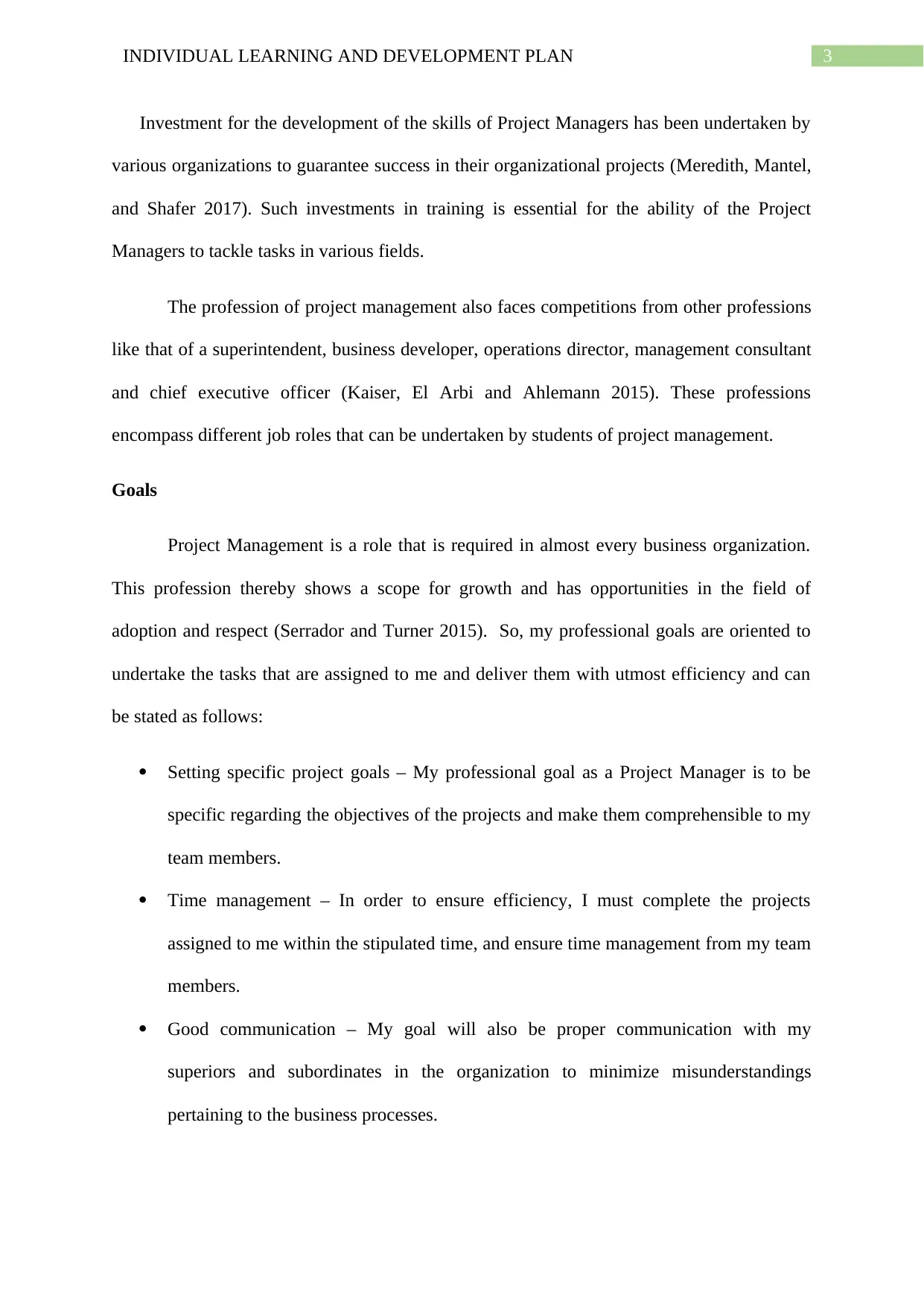
3INDIVIDUAL LEARNING AND DEVELOPMENT PLAN
Investment for the development of the skills of Project Managers has been undertaken by
various organizations to guarantee success in their organizational projects (Meredith, Mantel,
and Shafer 2017). Such investments in training is essential for the ability of the Project
Managers to tackle tasks in various fields.
The profession of project management also faces competitions from other professions
like that of a superintendent, business developer, operations director, management consultant
and chief executive officer (Kaiser, El Arbi and Ahlemann 2015). These professions
encompass different job roles that can be undertaken by students of project management.
Goals
Project Management is a role that is required in almost every business organization.
This profession thereby shows a scope for growth and has opportunities in the field of
adoption and respect (Serrador and Turner 2015). So, my professional goals are oriented to
undertake the tasks that are assigned to me and deliver them with utmost efficiency and can
be stated as follows:
Setting specific project goals – My professional goal as a Project Manager is to be
specific regarding the objectives of the projects and make them comprehensible to my
team members.
Time management – In order to ensure efficiency, I must complete the projects
assigned to me within the stipulated time, and ensure time management from my team
members.
Good communication – My goal will also be proper communication with my
superiors and subordinates in the organization to minimize misunderstandings
pertaining to the business processes.
Investment for the development of the skills of Project Managers has been undertaken by
various organizations to guarantee success in their organizational projects (Meredith, Mantel,
and Shafer 2017). Such investments in training is essential for the ability of the Project
Managers to tackle tasks in various fields.
The profession of project management also faces competitions from other professions
like that of a superintendent, business developer, operations director, management consultant
and chief executive officer (Kaiser, El Arbi and Ahlemann 2015). These professions
encompass different job roles that can be undertaken by students of project management.
Goals
Project Management is a role that is required in almost every business organization.
This profession thereby shows a scope for growth and has opportunities in the field of
adoption and respect (Serrador and Turner 2015). So, my professional goals are oriented to
undertake the tasks that are assigned to me and deliver them with utmost efficiency and can
be stated as follows:
Setting specific project goals – My professional goal as a Project Manager is to be
specific regarding the objectives of the projects and make them comprehensible to my
team members.
Time management – In order to ensure efficiency, I must complete the projects
assigned to me within the stipulated time, and ensure time management from my team
members.
Good communication – My goal will also be proper communication with my
superiors and subordinates in the organization to minimize misunderstandings
pertaining to the business processes.
Paraphrase This Document
Need a fresh take? Get an instant paraphrase of this document with our AI Paraphraser
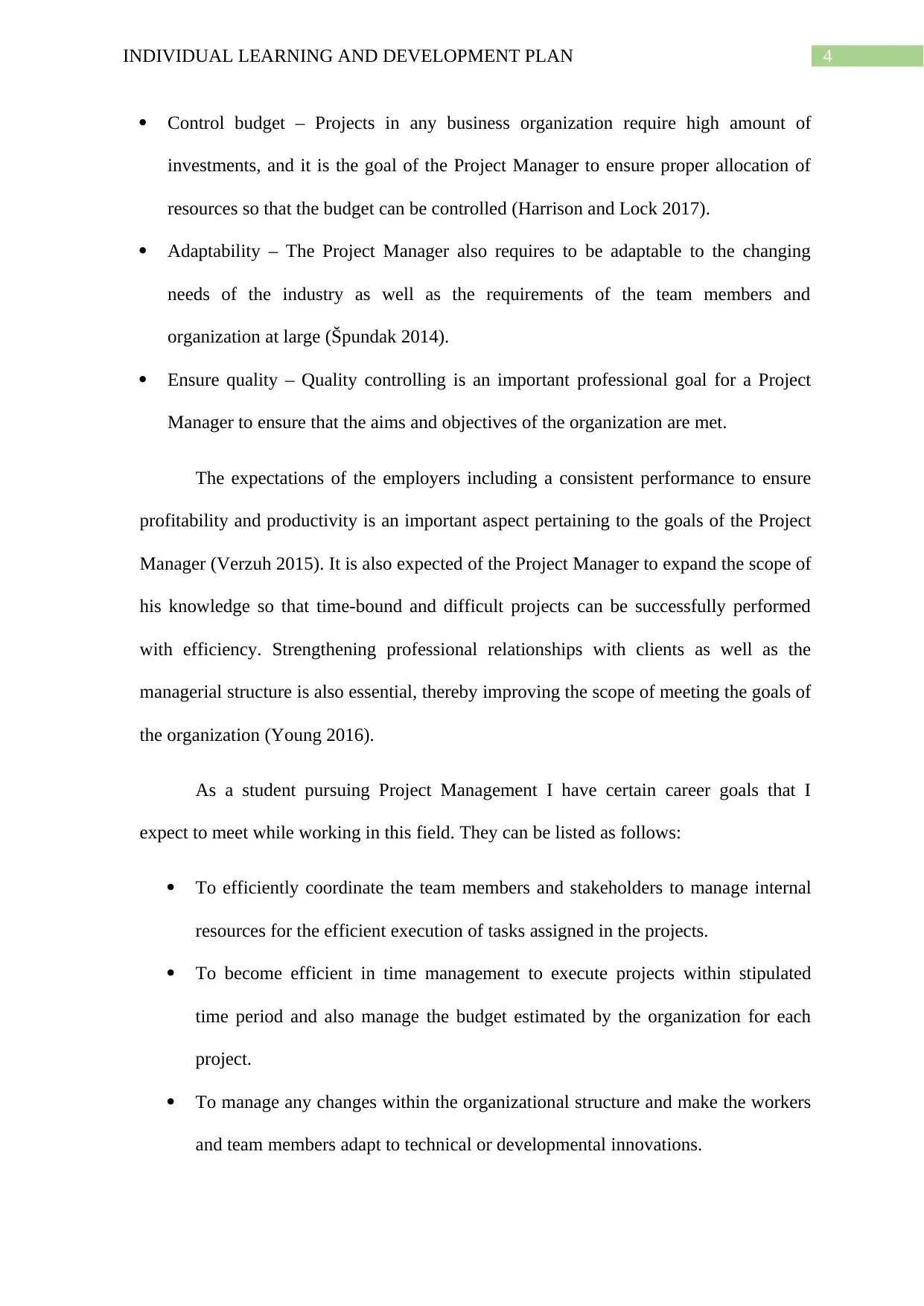
4INDIVIDUAL LEARNING AND DEVELOPMENT PLAN
Control budget – Projects in any business organization require high amount of
investments, and it is the goal of the Project Manager to ensure proper allocation of
resources so that the budget can be controlled (Harrison and Lock 2017).
Adaptability – The Project Manager also requires to be adaptable to the changing
needs of the industry as well as the requirements of the team members and
organization at large (Špundak 2014).
Ensure quality – Quality controlling is an important professional goal for a Project
Manager to ensure that the aims and objectives of the organization are met.
The expectations of the employers including a consistent performance to ensure
profitability and productivity is an important aspect pertaining to the goals of the Project
Manager (Verzuh 2015). It is also expected of the Project Manager to expand the scope of
his knowledge so that time-bound and difficult projects can be successfully performed
with efficiency. Strengthening professional relationships with clients as well as the
managerial structure is also essential, thereby improving the scope of meeting the goals of
the organization (Young 2016).
As a student pursuing Project Management I have certain career goals that I
expect to meet while working in this field. They can be listed as follows:
To efficiently coordinate the team members and stakeholders to manage internal
resources for the efficient execution of tasks assigned in the projects.
To become efficient in time management to execute projects within stipulated
time period and also manage the budget estimated by the organization for each
project.
To manage any changes within the organizational structure and make the workers
and team members adapt to technical or developmental innovations.
Control budget – Projects in any business organization require high amount of
investments, and it is the goal of the Project Manager to ensure proper allocation of
resources so that the budget can be controlled (Harrison and Lock 2017).
Adaptability – The Project Manager also requires to be adaptable to the changing
needs of the industry as well as the requirements of the team members and
organization at large (Špundak 2014).
Ensure quality – Quality controlling is an important professional goal for a Project
Manager to ensure that the aims and objectives of the organization are met.
The expectations of the employers including a consistent performance to ensure
profitability and productivity is an important aspect pertaining to the goals of the Project
Manager (Verzuh 2015). It is also expected of the Project Manager to expand the scope of
his knowledge so that time-bound and difficult projects can be successfully performed
with efficiency. Strengthening professional relationships with clients as well as the
managerial structure is also essential, thereby improving the scope of meeting the goals of
the organization (Young 2016).
As a student pursuing Project Management I have certain career goals that I
expect to meet while working in this field. They can be listed as follows:
To efficiently coordinate the team members and stakeholders to manage internal
resources for the efficient execution of tasks assigned in the projects.
To become efficient in time management to execute projects within stipulated
time period and also manage the budget estimated by the organization for each
project.
To manage any changes within the organizational structure and make the workers
and team members adapt to technical or developmental innovations.
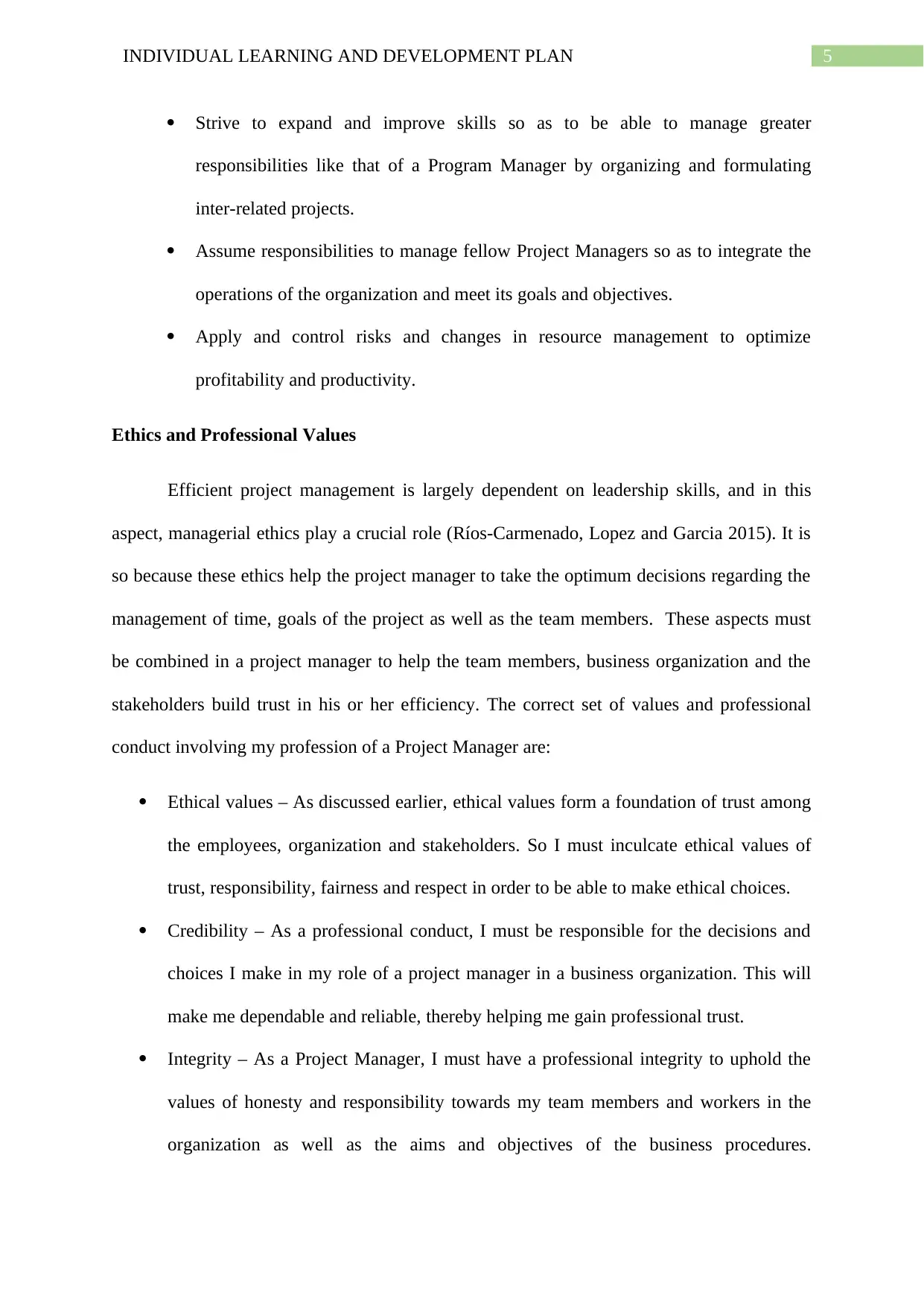
5INDIVIDUAL LEARNING AND DEVELOPMENT PLAN
Strive to expand and improve skills so as to be able to manage greater
responsibilities like that of a Program Manager by organizing and formulating
inter-related projects.
Assume responsibilities to manage fellow Project Managers so as to integrate the
operations of the organization and meet its goals and objectives.
Apply and control risks and changes in resource management to optimize
profitability and productivity.
Ethics and Professional Values
Efficient project management is largely dependent on leadership skills, and in this
aspect, managerial ethics play a crucial role (Ríos-Carmenado, Lopez and Garcia 2015). It is
so because these ethics help the project manager to take the optimum decisions regarding the
management of time, goals of the project as well as the team members. These aspects must
be combined in a project manager to help the team members, business organization and the
stakeholders build trust in his or her efficiency. The correct set of values and professional
conduct involving my profession of a Project Manager are:
Ethical values – As discussed earlier, ethical values form a foundation of trust among
the employees, organization and stakeholders. So I must inculcate ethical values of
trust, responsibility, fairness and respect in order to be able to make ethical choices.
Credibility – As a professional conduct, I must be responsible for the decisions and
choices I make in my role of a project manager in a business organization. This will
make me dependable and reliable, thereby helping me gain professional trust.
Integrity – As a Project Manager, I must have a professional integrity to uphold the
values of honesty and responsibility towards my team members and workers in the
organization as well as the aims and objectives of the business procedures.
Strive to expand and improve skills so as to be able to manage greater
responsibilities like that of a Program Manager by organizing and formulating
inter-related projects.
Assume responsibilities to manage fellow Project Managers so as to integrate the
operations of the organization and meet its goals and objectives.
Apply and control risks and changes in resource management to optimize
profitability and productivity.
Ethics and Professional Values
Efficient project management is largely dependent on leadership skills, and in this
aspect, managerial ethics play a crucial role (Ríos-Carmenado, Lopez and Garcia 2015). It is
so because these ethics help the project manager to take the optimum decisions regarding the
management of time, goals of the project as well as the team members. These aspects must
be combined in a project manager to help the team members, business organization and the
stakeholders build trust in his or her efficiency. The correct set of values and professional
conduct involving my profession of a Project Manager are:
Ethical values – As discussed earlier, ethical values form a foundation of trust among
the employees, organization and stakeholders. So I must inculcate ethical values of
trust, responsibility, fairness and respect in order to be able to make ethical choices.
Credibility – As a professional conduct, I must be responsible for the decisions and
choices I make in my role of a project manager in a business organization. This will
make me dependable and reliable, thereby helping me gain professional trust.
Integrity – As a Project Manager, I must have a professional integrity to uphold the
values of honesty and responsibility towards my team members and workers in the
organization as well as the aims and objectives of the business procedures.
⊘ This is a preview!⊘
Do you want full access?
Subscribe today to unlock all pages.

Trusted by 1+ million students worldwide
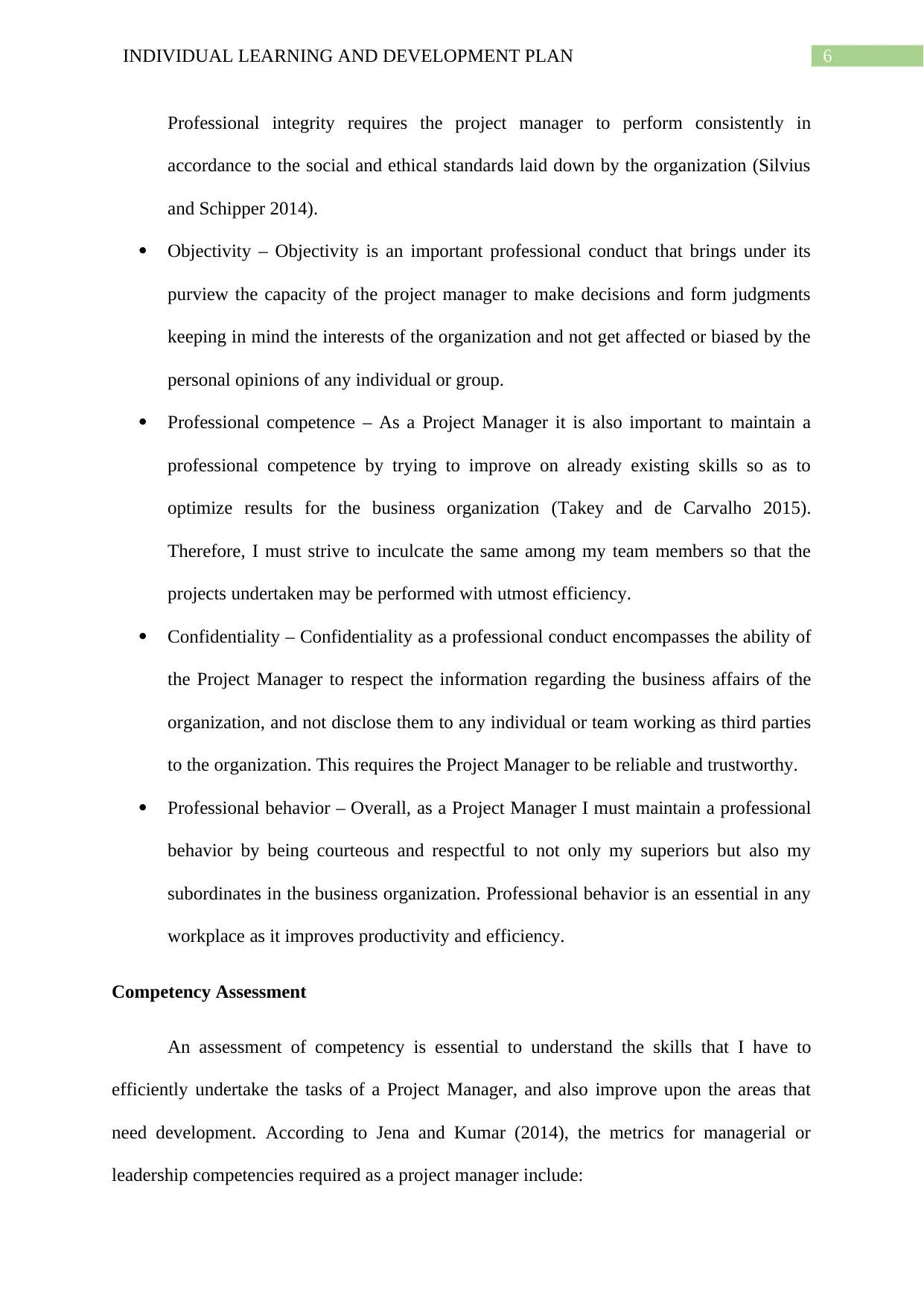
6INDIVIDUAL LEARNING AND DEVELOPMENT PLAN
Professional integrity requires the project manager to perform consistently in
accordance to the social and ethical standards laid down by the organization (Silvius
and Schipper 2014).
Objectivity – Objectivity is an important professional conduct that brings under its
purview the capacity of the project manager to make decisions and form judgments
keeping in mind the interests of the organization and not get affected or biased by the
personal opinions of any individual or group.
Professional competence – As a Project Manager it is also important to maintain a
professional competence by trying to improve on already existing skills so as to
optimize results for the business organization (Takey and de Carvalho 2015).
Therefore, I must strive to inculcate the same among my team members so that the
projects undertaken may be performed with utmost efficiency.
Confidentiality – Confidentiality as a professional conduct encompasses the ability of
the Project Manager to respect the information regarding the business affairs of the
organization, and not disclose them to any individual or team working as third parties
to the organization. This requires the Project Manager to be reliable and trustworthy.
Professional behavior – Overall, as a Project Manager I must maintain a professional
behavior by being courteous and respectful to not only my superiors but also my
subordinates in the business organization. Professional behavior is an essential in any
workplace as it improves productivity and efficiency.
Competency Assessment
An assessment of competency is essential to understand the skills that I have to
efficiently undertake the tasks of a Project Manager, and also improve upon the areas that
need development. According to Jena and Kumar (2014), the metrics for managerial or
leadership competencies required as a project manager include:
Professional integrity requires the project manager to perform consistently in
accordance to the social and ethical standards laid down by the organization (Silvius
and Schipper 2014).
Objectivity – Objectivity is an important professional conduct that brings under its
purview the capacity of the project manager to make decisions and form judgments
keeping in mind the interests of the organization and not get affected or biased by the
personal opinions of any individual or group.
Professional competence – As a Project Manager it is also important to maintain a
professional competence by trying to improve on already existing skills so as to
optimize results for the business organization (Takey and de Carvalho 2015).
Therefore, I must strive to inculcate the same among my team members so that the
projects undertaken may be performed with utmost efficiency.
Confidentiality – Confidentiality as a professional conduct encompasses the ability of
the Project Manager to respect the information regarding the business affairs of the
organization, and not disclose them to any individual or team working as third parties
to the organization. This requires the Project Manager to be reliable and trustworthy.
Professional behavior – Overall, as a Project Manager I must maintain a professional
behavior by being courteous and respectful to not only my superiors but also my
subordinates in the business organization. Professional behavior is an essential in any
workplace as it improves productivity and efficiency.
Competency Assessment
An assessment of competency is essential to understand the skills that I have to
efficiently undertake the tasks of a Project Manager, and also improve upon the areas that
need development. According to Jena and Kumar (2014), the metrics for managerial or
leadership competencies required as a project manager include:
Paraphrase This Document
Need a fresh take? Get an instant paraphrase of this document with our AI Paraphraser
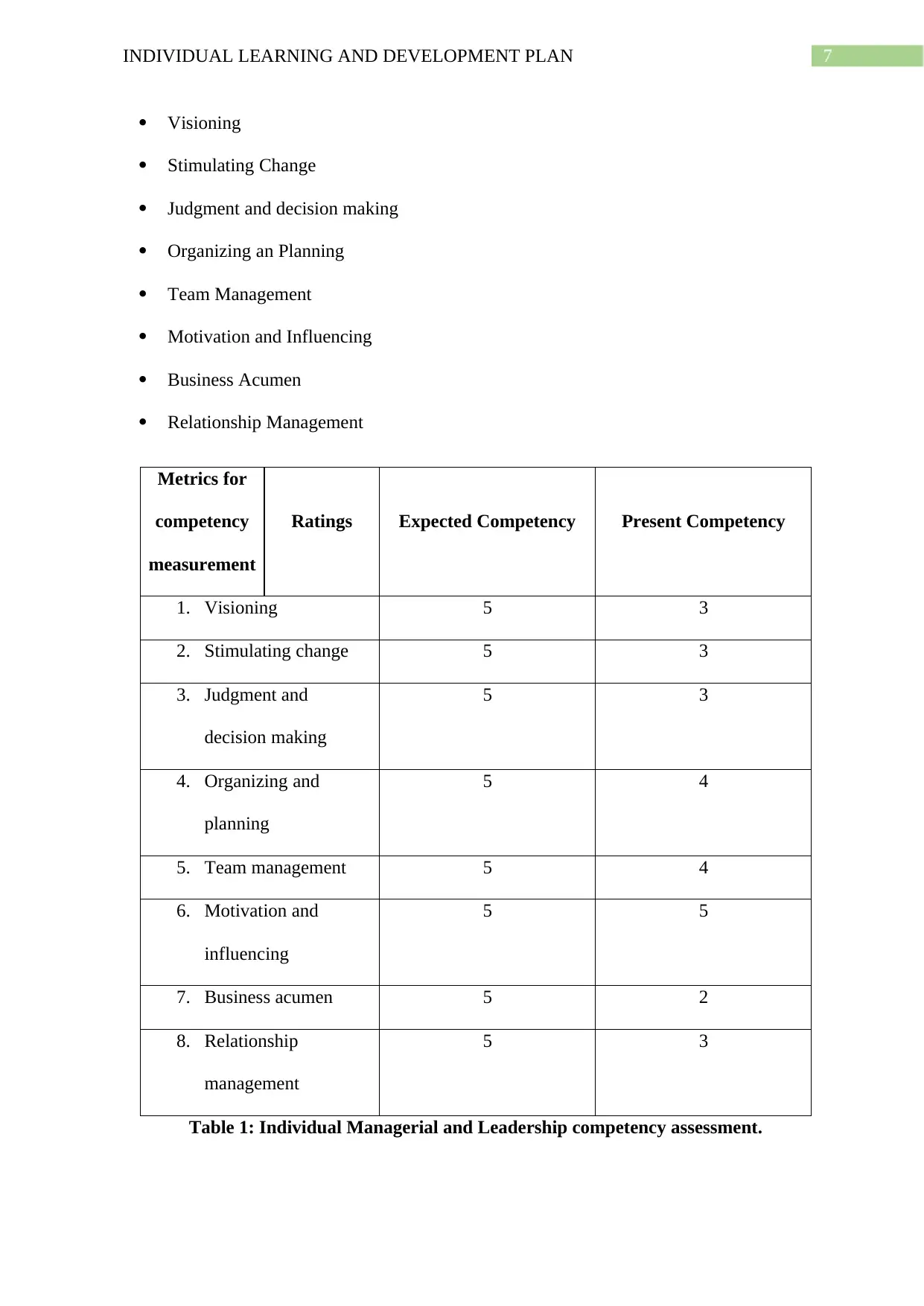
7INDIVIDUAL LEARNING AND DEVELOPMENT PLAN
Visioning
Stimulating Change
Judgment and decision making
Organizing an Planning
Team Management
Motivation and Influencing
Business Acumen
Relationship Management
Metrics for
competency
measurement
Ratings Expected Competency Present Competency
1. Visioning 5 3
2. Stimulating change 5 3
3. Judgment and
decision making
5 3
4. Organizing and
planning
5 4
5. Team management 5 4
6. Motivation and
influencing
5 5
7. Business acumen 5 2
8. Relationship
management
5 3
Table 1: Individual Managerial and Leadership competency assessment.
Visioning
Stimulating Change
Judgment and decision making
Organizing an Planning
Team Management
Motivation and Influencing
Business Acumen
Relationship Management
Metrics for
competency
measurement
Ratings Expected Competency Present Competency
1. Visioning 5 3
2. Stimulating change 5 3
3. Judgment and
decision making
5 3
4. Organizing and
planning
5 4
5. Team management 5 4
6. Motivation and
influencing
5 5
7. Business acumen 5 2
8. Relationship
management
5 3
Table 1: Individual Managerial and Leadership competency assessment.
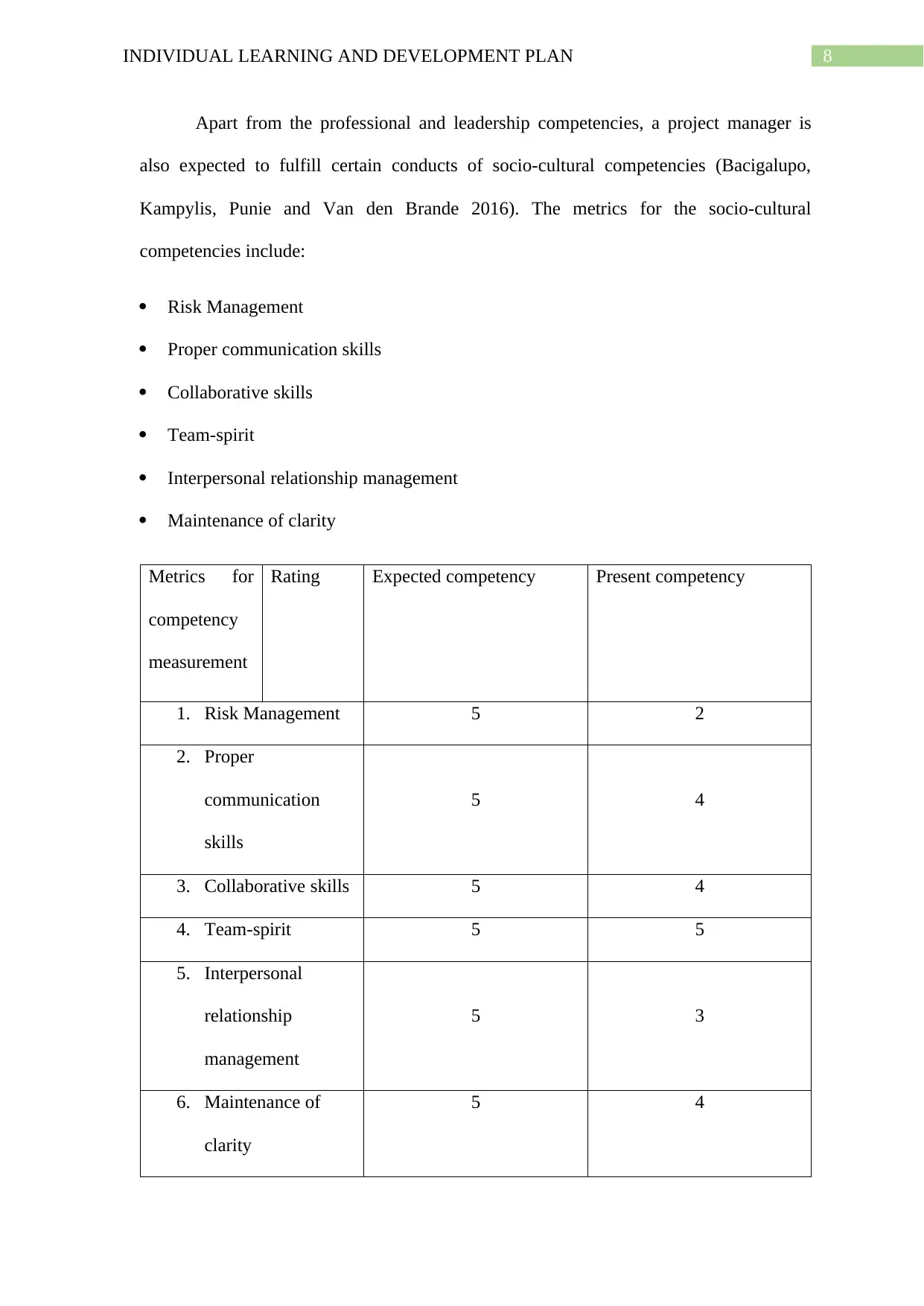
8INDIVIDUAL LEARNING AND DEVELOPMENT PLAN
Apart from the professional and leadership competencies, a project manager is
also expected to fulfill certain conducts of socio-cultural competencies (Bacigalupo,
Kampylis, Punie and Van den Brande 2016). The metrics for the socio-cultural
competencies include:
Risk Management
Proper communication skills
Collaborative skills
Team-spirit
Interpersonal relationship management
Maintenance of clarity
Metrics for
competency
measurement
Rating Expected competency Present competency
1. Risk Management 5 2
2. Proper
communication
skills
5 4
3. Collaborative skills 5 4
4. Team-spirit 5 5
5. Interpersonal
relationship
management
5 3
6. Maintenance of
clarity
5 4
Apart from the professional and leadership competencies, a project manager is
also expected to fulfill certain conducts of socio-cultural competencies (Bacigalupo,
Kampylis, Punie and Van den Brande 2016). The metrics for the socio-cultural
competencies include:
Risk Management
Proper communication skills
Collaborative skills
Team-spirit
Interpersonal relationship management
Maintenance of clarity
Metrics for
competency
measurement
Rating Expected competency Present competency
1. Risk Management 5 2
2. Proper
communication
skills
5 4
3. Collaborative skills 5 4
4. Team-spirit 5 5
5. Interpersonal
relationship
management
5 3
6. Maintenance of
clarity
5 4
⊘ This is a preview!⊘
Do you want full access?
Subscribe today to unlock all pages.

Trusted by 1+ million students worldwide
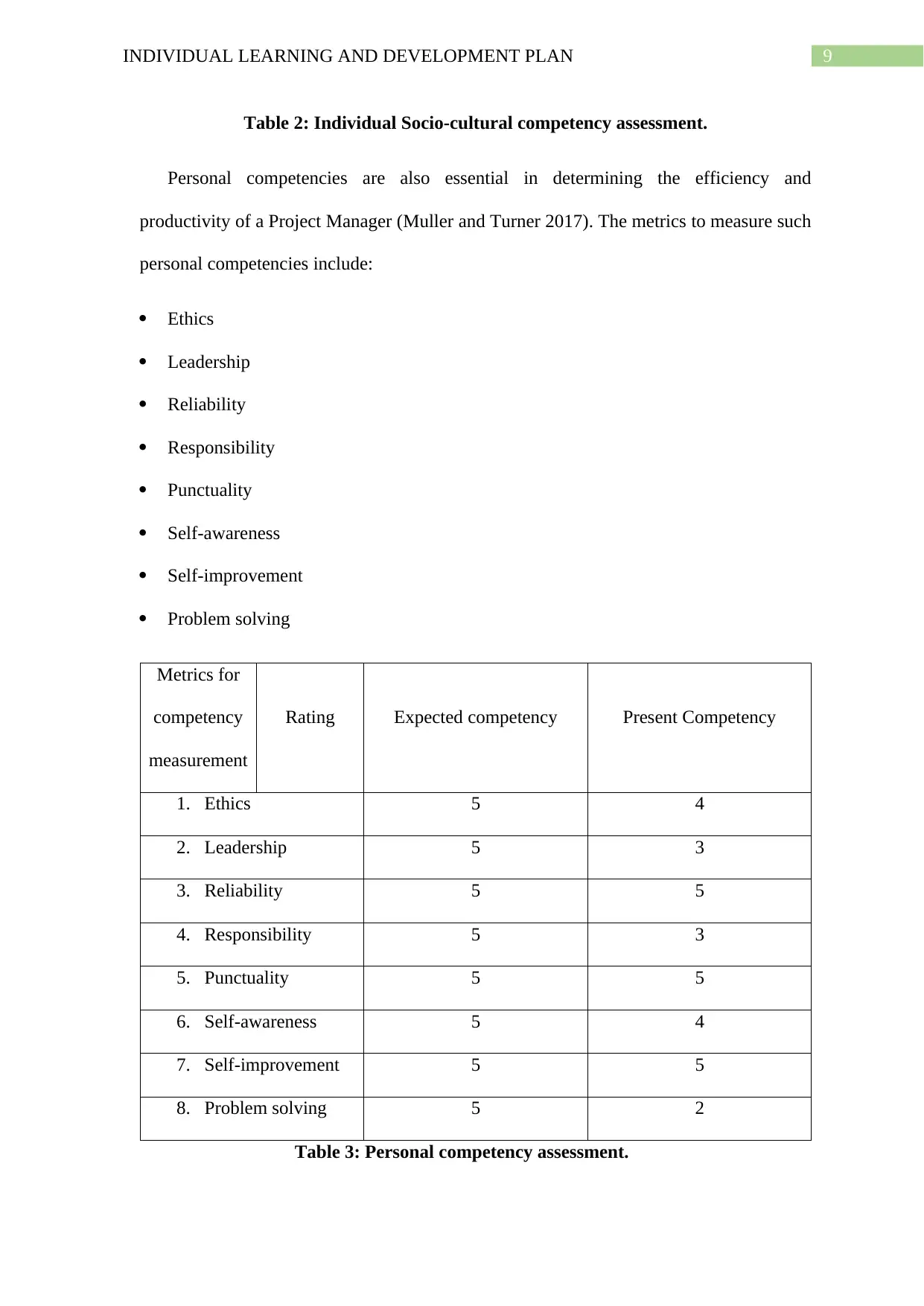
9INDIVIDUAL LEARNING AND DEVELOPMENT PLAN
Table 2: Individual Socio-cultural competency assessment.
Personal competencies are also essential in determining the efficiency and
productivity of a Project Manager (Muller and Turner 2017). The metrics to measure such
personal competencies include:
Ethics
Leadership
Reliability
Responsibility
Punctuality
Self-awareness
Self-improvement
Problem solving
Metrics for
competency
measurement
Rating Expected competency Present Competency
1. Ethics 5 4
2. Leadership 5 3
3. Reliability 5 5
4. Responsibility 5 3
5. Punctuality 5 5
6. Self-awareness 5 4
7. Self-improvement 5 5
8. Problem solving 5 2
Table 3: Personal competency assessment.
Table 2: Individual Socio-cultural competency assessment.
Personal competencies are also essential in determining the efficiency and
productivity of a Project Manager (Muller and Turner 2017). The metrics to measure such
personal competencies include:
Ethics
Leadership
Reliability
Responsibility
Punctuality
Self-awareness
Self-improvement
Problem solving
Metrics for
competency
measurement
Rating Expected competency Present Competency
1. Ethics 5 4
2. Leadership 5 3
3. Reliability 5 5
4. Responsibility 5 3
5. Punctuality 5 5
6. Self-awareness 5 4
7. Self-improvement 5 5
8. Problem solving 5 2
Table 3: Personal competency assessment.
Paraphrase This Document
Need a fresh take? Get an instant paraphrase of this document with our AI Paraphraser
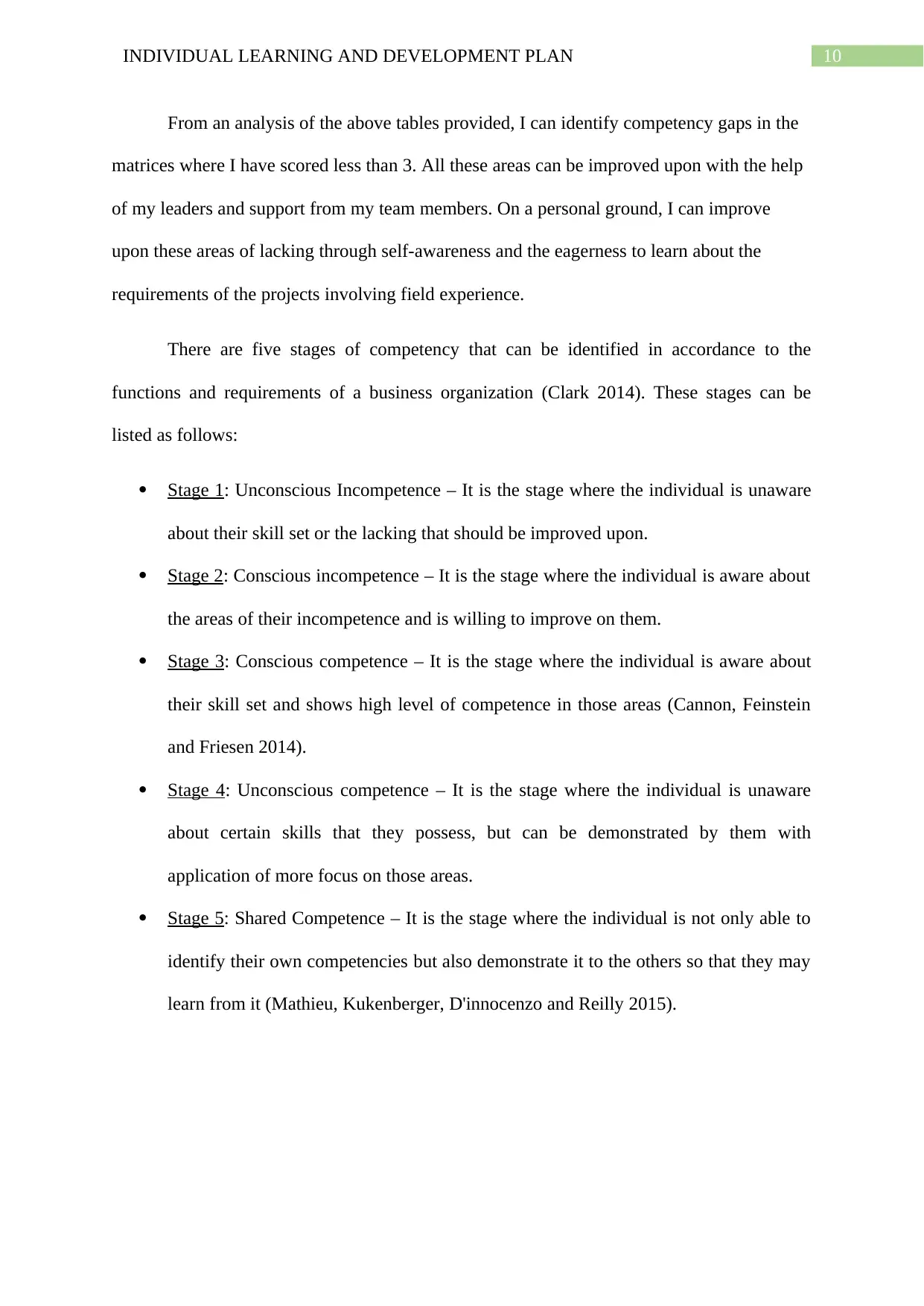
10INDIVIDUAL LEARNING AND DEVELOPMENT PLAN
From an analysis of the above tables provided, I can identify competency gaps in the
matrices where I have scored less than 3. All these areas can be improved upon with the help
of my leaders and support from my team members. On a personal ground, I can improve
upon these areas of lacking through self-awareness and the eagerness to learn about the
requirements of the projects involving field experience.
There are five stages of competency that can be identified in accordance to the
functions and requirements of a business organization (Clark 2014). These stages can be
listed as follows:
Stage 1: Unconscious Incompetence – It is the stage where the individual is unaware
about their skill set or the lacking that should be improved upon.
Stage 2: Conscious incompetence – It is the stage where the individual is aware about
the areas of their incompetence and is willing to improve on them.
Stage 3: Conscious competence – It is the stage where the individual is aware about
their skill set and shows high level of competence in those areas (Cannon, Feinstein
and Friesen 2014).
Stage 4: Unconscious competence – It is the stage where the individual is unaware
about certain skills that they possess, but can be demonstrated by them with
application of more focus on those areas.
Stage 5: Shared Competence – It is the stage where the individual is not only able to
identify their own competencies but also demonstrate it to the others so that they may
learn from it (Mathieu, Kukenberger, D'innocenzo and Reilly 2015).
From an analysis of the above tables provided, I can identify competency gaps in the
matrices where I have scored less than 3. All these areas can be improved upon with the help
of my leaders and support from my team members. On a personal ground, I can improve
upon these areas of lacking through self-awareness and the eagerness to learn about the
requirements of the projects involving field experience.
There are five stages of competency that can be identified in accordance to the
functions and requirements of a business organization (Clark 2014). These stages can be
listed as follows:
Stage 1: Unconscious Incompetence – It is the stage where the individual is unaware
about their skill set or the lacking that should be improved upon.
Stage 2: Conscious incompetence – It is the stage where the individual is aware about
the areas of their incompetence and is willing to improve on them.
Stage 3: Conscious competence – It is the stage where the individual is aware about
their skill set and shows high level of competence in those areas (Cannon, Feinstein
and Friesen 2014).
Stage 4: Unconscious competence – It is the stage where the individual is unaware
about certain skills that they possess, but can be demonstrated by them with
application of more focus on those areas.
Stage 5: Shared Competence – It is the stage where the individual is not only able to
identify their own competencies but also demonstrate it to the others so that they may
learn from it (Mathieu, Kukenberger, D'innocenzo and Reilly 2015).
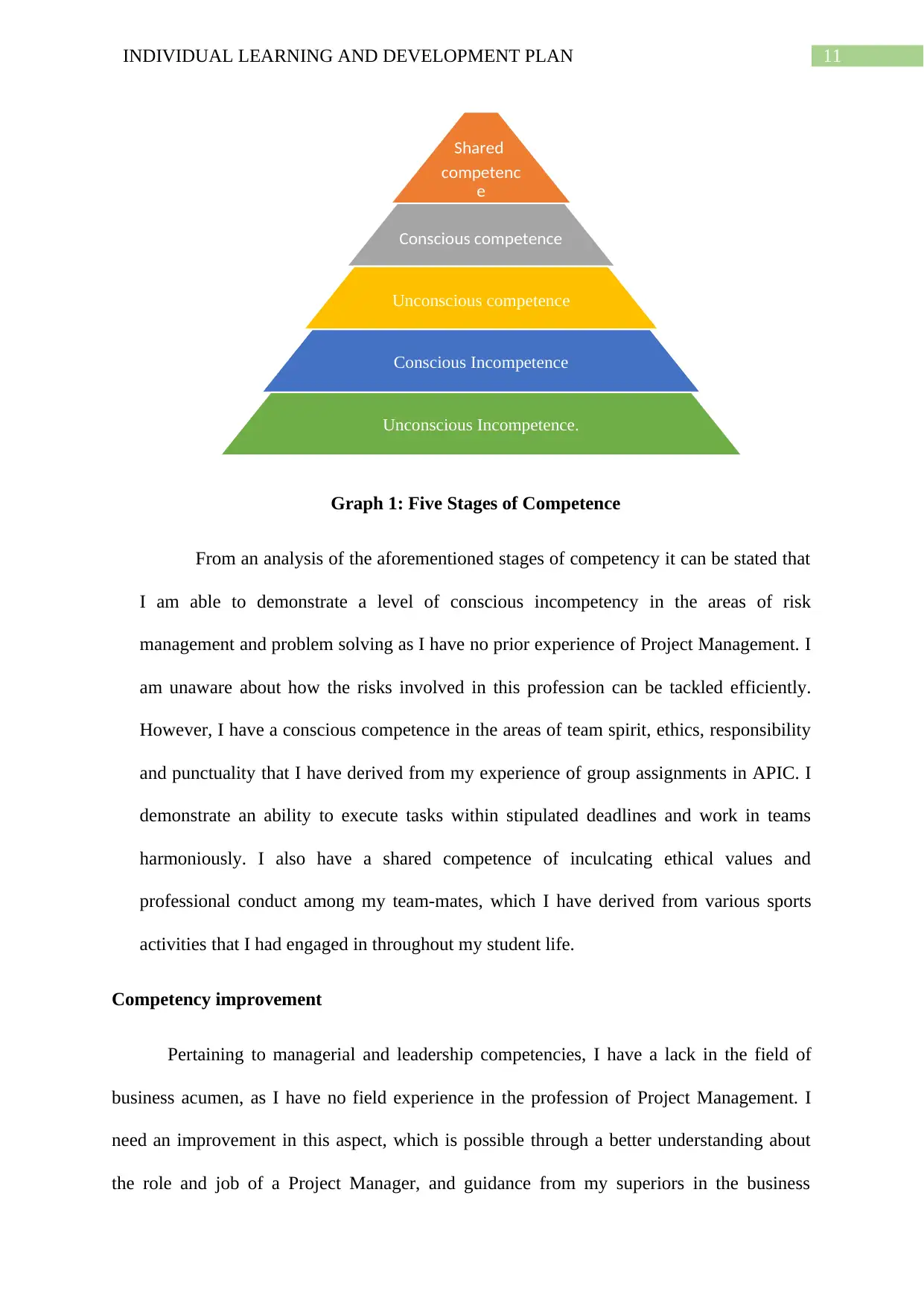
11INDIVIDUAL LEARNING AND DEVELOPMENT PLAN
Graph 1: Five Stages of Competence
From an analysis of the aforementioned stages of competency it can be stated that
I am able to demonstrate a level of conscious incompetency in the areas of risk
management and problem solving as I have no prior experience of Project Management. I
am unaware about how the risks involved in this profession can be tackled efficiently.
However, I have a conscious competence in the areas of team spirit, ethics, responsibility
and punctuality that I have derived from my experience of group assignments in APIC. I
demonstrate an ability to execute tasks within stipulated deadlines and work in teams
harmoniously. I also have a shared competence of inculcating ethical values and
professional conduct among my team-mates, which I have derived from various sports
activities that I had engaged in throughout my student life.
Competency improvement
Pertaining to managerial and leadership competencies, I have a lack in the field of
business acumen, as I have no field experience in the profession of Project Management. I
need an improvement in this aspect, which is possible through a better understanding about
the role and job of a Project Manager, and guidance from my superiors in the business
Shared
competenc
e
Conscious competence
Unconscious competence
Conscious Incompetence
Unconscious Incompetence.
Graph 1: Five Stages of Competence
From an analysis of the aforementioned stages of competency it can be stated that
I am able to demonstrate a level of conscious incompetency in the areas of risk
management and problem solving as I have no prior experience of Project Management. I
am unaware about how the risks involved in this profession can be tackled efficiently.
However, I have a conscious competence in the areas of team spirit, ethics, responsibility
and punctuality that I have derived from my experience of group assignments in APIC. I
demonstrate an ability to execute tasks within stipulated deadlines and work in teams
harmoniously. I also have a shared competence of inculcating ethical values and
professional conduct among my team-mates, which I have derived from various sports
activities that I had engaged in throughout my student life.
Competency improvement
Pertaining to managerial and leadership competencies, I have a lack in the field of
business acumen, as I have no field experience in the profession of Project Management. I
need an improvement in this aspect, which is possible through a better understanding about
the role and job of a Project Manager, and guidance from my superiors in the business
Shared
competenc
e
Conscious competence
Unconscious competence
Conscious Incompetence
Unconscious Incompetence.
⊘ This is a preview!⊘
Do you want full access?
Subscribe today to unlock all pages.

Trusted by 1+ million students worldwide
1 out of 17
Related Documents
Your All-in-One AI-Powered Toolkit for Academic Success.
+13062052269
info@desklib.com
Available 24*7 on WhatsApp / Email
![[object Object]](/_next/static/media/star-bottom.7253800d.svg)
Unlock your academic potential
Copyright © 2020–2026 A2Z Services. All Rights Reserved. Developed and managed by ZUCOL.





